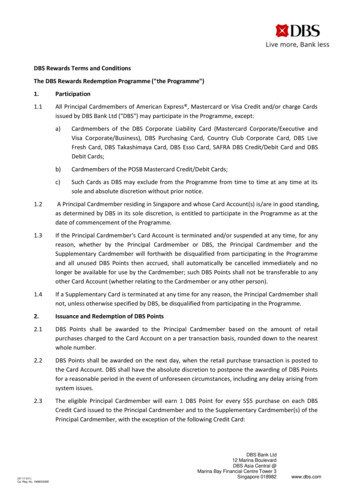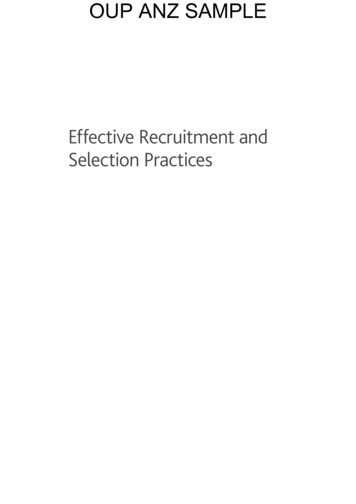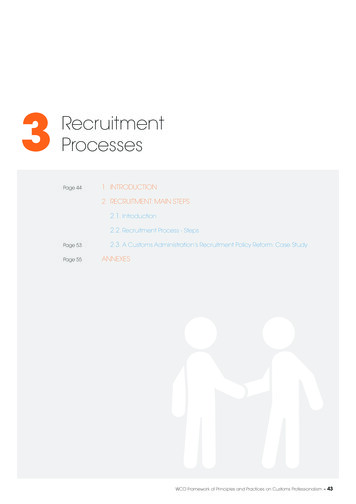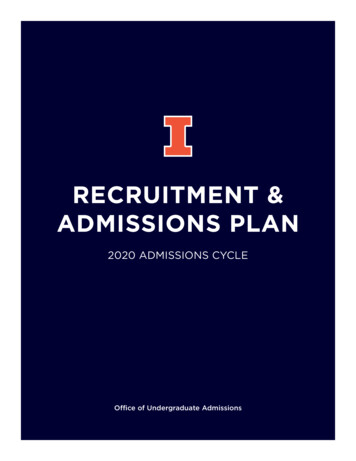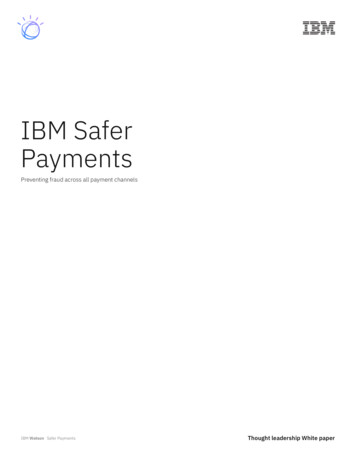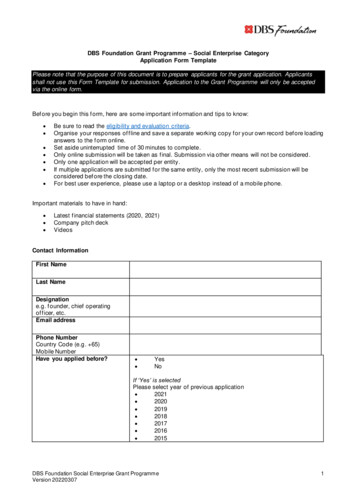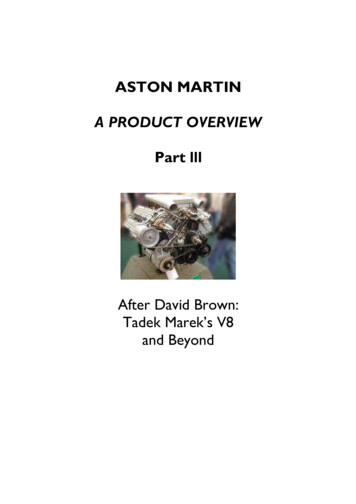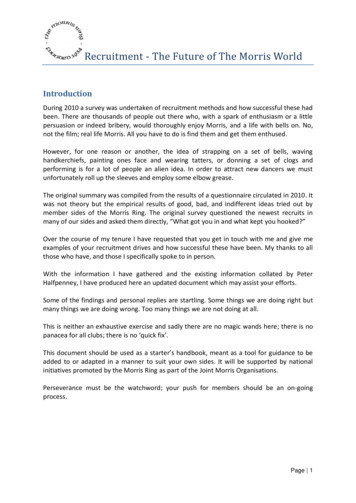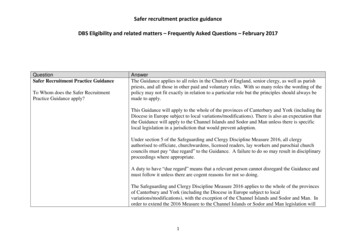
Transcription
Safer recruitment practice guidanceDBS Eligibility and related matters – Frequently Asked Questions – February 2017QuestionSafer Recruitment Practice GuidanceTo Whom does the Safer RecruitmentPractice Guidance apply?AnswerThe Guidance applies to all roles in the Church of England, senior clergy, as well as parishpriests, and all those in other paid and voluntary roles. With so many roles the wording of thepolicy may not fit exactly in relation to a particular role but the principles should always bemade to apply.This Guidance will apply to the whole of the provinces of Canterbury and York (including theDiocese in Europe subject to local variations/modifications). There is also an expectation thatthe Guidance will apply to the Channel Islands and Sodor and Man unless there is specificlocal legislation in a jurisdiction that would prevent adoption.Under section 5 of the Safeguarding and Clergy Discipline Measure 2016, all clergyauthorised to officiate, churchwardens, licensed readers, lay workers and parochial churchcouncils must pay “due regard” to the Guidance. A failure to do so may result in disciplinaryproceedings where appropriate.A duty to have “due regard” means that a relevant person cannot disregard the Guidance andmust follow it unless there are cogent reasons for not so doing.The Safeguarding and Clergy Discipline Measure 2016 applies to the whole of the provincesof Canterbury and York (including the Diocese in Europe subject to localvariations/modifications), with the exception of the Channel Islands and Sodor and Man. Inorder to extend the 2016 Measure to the Channel Islands or Sodor and Man legislation will1
Safer recruitment practice guidanceDBS Eligibility and related matters – Frequently Asked Questions – February 2017need to be passed by the relevant island jurisdictions in accordance with section 12 of thatMeasure.See paragraph 1 – Introduction – Safer Recruitment Practice Guidance.EligibilityYou need to ask yourself the following questions:ChildrenBroadly, how do I assess whether a volunteerrole at my church is eligible for a DBScheck? Does the role mean that the relevant individual either supervised/unsupervised on afrequent/infrequent basis, teaches, trains, instructs, cares for or supervises children or providesadvice/guidance on physical, emotional or educational well-being to children? If the answer is“no” – then there will be no eligibility for any form of enhanced check in relation to children.Adults Does the role in question mean that the individual is carrying out one of the 6categories of activity (i.e. health care, personal care, social work, assisting with cash, bills orshopping, assistance with affairs (e.g. under a Lasting Power of Attorney) or transportation)?If the answer is “no”, then it is not “regulated activity” in relation to adults and there is noeligibility for an enhanced check with barring information in relation to adults. If not “regulated activity” in relation to adults, does the role mean that a person on,either a frequent, intensive or overnight basis, provides training, teaching, instruction,assistance, advice or guidance to an adult who receives a health or social care service (e.g. isin a care home or receives any form of care or assistance due to age, illness or disability) or a“specified activity” (e.g. in prison)? If the answer is “no” – then there will be no eligibility foran enhanced check without barring information in relation to adults.2
Safer recruitment practice guidanceDBS Eligibility and related matters – Frequently Asked Questions – February 2017Please note this is only a broad summary for full details you must refer to the SaferRecruitment Practice Guidance (in particular Appendix 7 and 8) and if necessary seek legaladvice.ReadersAre readers eligible for a DBS check?Further advice can be found on the Government website - ance-for-employers.Yes all new readers are eligible for a DBS check. Both during training and once licensed, it isexpected that new readers will be working with vulnerable groups (i.e. children/vulnerableadults) in some capacity.For all readers in post, (i.e. at renewal time), you need to consider the nature of their currentduties (i.e. what the bishop has licensed them to do) to take account of any local variations toestablish whether they are eligible for any form of DBS check.See paragraph 6.3 and Appendix 7 and 8 of the Safer Recruitment Practice Guidance.Head ServerNo. Generally a “head server” would not be eligible for any form of DBS check.Are Head Servers eligible for a DBS check?That said, if there is something in this particular head server’s duties that mean he/she isworking with children/vulnerable adults, then he/she may be eligible for a DBS check. Forinstance, if the head server is “supervising children” and satisfies the frequency criteria andhe/she is not supervised, then he/she may be engaging in regulated activity, (i.e. eligible for anenhanced check (with barring information)). Even if he/she fails the frequency test and/or issupervised there could be eligibility for an enhanced check (without barring information).If on the other hand, the head server merely has a supervisory role in relation to thecongregation in general, some of whom happen to be children/vulnerable adults, then he/she3
Safer recruitment practice guidanceDBS Eligibility and related matters – Frequently Asked Questions – February 2017will not be eligible for a DBS check, (although he/she would always be eligible for a Basiccriminal conviction check, which would reveal unspent criminal conviction information only).See Appendix 7 and 8 of the Safer Recruitment Practice Guidance.Open the Book VolunteersAre Open the Book volunteers eligible for aDBS check?Yes. As supervised volunteers working/having substantial contact with children in a specifiedestablishment (i.e. school) they will be eligible for an enhanced check without barringinformation, even if they engage in such work infrequently.See Appendix 7 of the Safer Recruitment Practice Guidance.Pastoral Home VisitorsYes. Pastoral Home Visitors working with vulnerable adults will be eligible for a DBS check.Are Pastoral Home Visitors eligible for aDBS check?The level of the check will depend on the nature of the support work that they areundertaking. If the nature of the support work involves personal care e.g. assistance witheating, drinking, washing etc. or assistance with peoples’ cash, bills or shopping due to age,illness or disability or conveying someone due to age, illness or disability to, from or betweenplaces where they receive healthcare, personal care or social care, they will be eligible for anenhanced check with barring. If they provide instruction, assistance, advice or guidance to anadult who receives a health or social care service (e.g. includes adults in care homes, shelteredhousing or receiving any form of care or assistance due to age, illness or disability), providedthey do so on a frequent (once a week); intensive (4 days or more in any 30 day period) orovernight basis (between the hours of 02:00 and 0600) they will be eligible for an enhancedcheck without barring.See Appendix 7 and 8 of the Safer Recruitment Practice Guidance.DBS AdministratorsNo. DBS administrators are not eligible for any form of DBS check. This is because they donot work with children or vulnerable adults and have little or no contact with these groups.4
Safer recruitment practice guidanceDBS Eligibility and related matters – Frequently Asked Questions – February 2017Are DBS administrators eligible for DBSchecks?DBS checks are for those who work/have substantial contact with children or vulnerableadults. Access to sensitive/confidential/personal information does not provide eligibility for aDBS check.A DBS administrator would be eligible for a basic check via Disclosure Scotland. This wouldreveal unspent criminal conviction information only.See Appendix 7 of the Safer Recruitment Practice Guidance.Worship LeadersAre Worship Leaders eligible for a DBScheck?No, generally, Worship Leaders are not eligible for a DBS check. That said, you will need toanalyse the nature of a particular Worship Leader’s role to see if there are any duties whichmean they are directly engaged/have substantial contact with children/vulnerable adults,which may make them eligible. For instance, carrying out services exclusively forchildren/vulnerable adults or if they are members of a PCC which qualifies as achildren/vulnerable adult’s charity.Worship Leaders will always be eligible for a basic check via Disclosure Scotland. Thiswould reveal unspent criminal conviction information only.See Appendix 8 of the Safer Recruitment Practice GuidanceVolunteers at the PalacesNo. If volunteer tour guides are merely organising tours, meeting and greeting members of thepublic, this in itself would not mean they are eligible for any form of DBS check.Are volunteer tour group guides eligible forany form of DBS check because there may bechildren/vulnerable adults in their tourgroups?It is possible that a child (or a vulnerable adult) may be a part of a tour group but they cannothave DBS checks “just in case” they might come across vulnerable people, (often known asthe “shop keeper” test). If volunteers are escorting “school parties” on tours of the palace andthe school’s teachers (and teaching assistants) are on the tour and supervising the children, the5
Safer recruitment practice guidanceDBS Eligibility and related matters – Frequently Asked Questions – February 2017tour guides would not be eligible for a DBS check as they are unlikely to be “caring for,supervising, instructing, teaching, training etc.” any children themselves.Of course, the tour guides would all be eligible for a basic check via Disclosure Scotland,which would reveal unspent criminal conviction information only.See Appendix 7 and 8 of the Safer Recruitment Practice Guidance.TrusteesI have just been elected as a member of aPCC, where the church runs a pastoral homevisiting scheme for vulnerable adults, whichincludes shopping for the housebound andconveying them to/from healthcareappointments, am I eligible for a DBS check?Yes. The PCC will be a classed as a vulnerable adult’s charity and as a trustee of such acharity you are eligible for a DBS check (an enhanced check without barring information).To qualify as such a charity, workers of the PCC, would have to normally include individualsengaging in regulated activity relating to vulnerable adults. In this case, the workers for thePCC carry out regulated activity with vulnerable adults. (The same situation would apply ifyou were a trustee of a PCC which is classed as a children’s charity because its workersengage in regulated activity in relation to children, (e.g. the PCC runs a Sunday School)).See Appendix 8 of the Safer Recruitment Practice Guidance.Cathedral choir tours and DBS eligibilityMy cathedral choir is going on tour, who iseligible for a DBS check?Those individuals who are responsible for teaching, training, supervising or caring for anychildren who are on the tour, will be eligible for a DBS check. If the tour is overnight, thiswill mean that the relevant individuals (i.e. those in charge of supervising/caring for thechildren) will be eligible for an enhanced check together with a barred list check.Adult choir members will not be eligible for a DBS check (unless the role includesresponsibility for teaching, training, caring for or supervising vulnerable groups (children or6
Safer recruitment practice guidanceDBS Eligibility and related matters – Frequently Asked Questions – February 2017adults)). They will remain eligible for a basic check via Disclosure Scotland, however, whichwould reveal unspent criminal conviction information only.See Appendix 8 of the Safer Recruitment Practice Guidance.The Secretary and Treasurer of the PCCUnder the Safeguarding and ClergyDiscipline Measure 2016 the parish secretaryand treasurer will be disqualified from actingin these roles if they are on a DBS barredlist(s) or are convicted of an offence underSchedule 1 of the Children and YoungPersons Act 1933. Does this mean that theyare eligible for DBS checks?No. Generally they will not be eligible for any form of DBS check unless they are actuallymembers of a PCC, which is a children/vulnerable adult charity and they are, therefore,charity trustees of such a charity. In such a case, they will be eligible for an enhanced checkwithout barring information, which means you would be able to receive convictioninformation (spent and unspent).They are, however, unlikely to be eligible for an enhanced check with barring information andyou will have to rely on an individual voluntarily disclosing whether or not he/she is barred.If the “secretary” and/or “treasurer” are not PCC members (or the PCC does not qualify as achildren’s/vulnerable adult’s charity) they will only be eligible for a basic check viaDisclosure Scotland (this will reveal unspent criminal conviction information only).See Appendix 8 of the Safer Recruitment Practice GuidancePCC members and ChurchwardensAppropriate checks should be carried out after the relevant individual is elected to his/herpost. It should be made clear to all nominees prior to any election that all appointments will beWhen should a person standing for election as subject to appropriate checks.a churchwarden or as a member of the PCCWhat check is appropriate will depend on the status of the PCC. If the PCC does not sponsorhave a criminal records check? And what checkis appropriate?or approve work with children/vulnerable adults neither the churchwardens nor the PCCmembers would be eligible for any form of DBS check. In these circumstances, such7
Safer recruitment practice guidanceDBS Eligibility and related matters – Frequently Asked Questions – February 2017individuals would be eligible for a basic check via Disclosure Scotland, which would revealunspent criminal conviction information only.If the PCC, as a charity, sponsors and approves, in its own name, work with children orvulnerable adults, then all PCC members (including the churchwardens, as ex officiomembers of the PCC), will be eligible for a DBS check (an enhanced criminal record checkwithout barring information).It is not a requirement to check all members of the PCC. The decision about who to check ona PCC is left to local determination and will depend on the specific circumstances.See Appendix 8 of the Safer Recruitment Practice Guidance for more information.Clergy moving around the DioceseIf a member of the clergy moves to a new jobin a neighbouring parish within the samediocese does he/she need a new DBS check?No. Anyone who works in a Church of England organisation and applies for a new role withinthe same diocese where he/she currently works does not require a new criminal record checkprovided: The result of the criminal record check has been seen;The result of the criminal record check is not out of date, (i.e. more than 5 years old);The new role is with the same “workforce” (i.e. children/vulnerable adults); andThe new role is eligible for the same/lower level of criminal record check as theprevious role.See the Safer Recruitment Practice Guidance – Paragraph 6 – DBS PortabilityPeople applying for roles in the churchwho have lived overseasThe person making the appointment should ask the applicant to obtain criminality information(also known as a certificate of good conduct/character) from his/her relevant embassy/highcommission (or police force). This means that in addition to the DBS check, the8
Safer recruitment practice guidanceDBS Eligibility and related matters – Frequently Asked Questions – February 2017What criminal record check do I need torequest if someone applies for a post fromoverseas?candidate/applicant must seek this additional check to cover the time he/she spent abroad.(Further advice can be found on the Home Office f such information is not available from the embassy/high commission etc. or if there areconcerns about the reliability of the information provided, the person(s) making theappointment should take extra care when taking up references and checking any previousemployment record. In such cases, additional references should be sought and at least onereference from a previous employer should be contacted by telephone as well as by letter.Of course, if he/she is to be employed (as opposed to just being a volunteer), the person’s“right to work” in the UK will need to be checked. See the following for more -right-to-workIndeed, even if a volunteer, the Home Office guidance (October 2013) states:“ Volunteering may be undertaken by asylum seekers, as long as they are carrying out thework on behalf of a registered charity, voluntary organisation or body that raises funds foreither, or public sector organisation.However, we do not support volunteering activities by anyone whose asylum application hasbeen refused and their appeal rights exhausted. As they no longer have a basis to remain inthe UK they should leave voluntarily ”.See paragraph 2.11 – Overseas applicants – Safer Recruitment Practice Guidance9
Safer recruitment practice guidanceDBS Eligibility and related matters – Frequently Asked Questions – February 2017OrdinandsAre Ordinands eligible for DBS checks? Andshould Ordinands be treated as volunteers forthe purpose of such checks (i.e. will thechecks be free of charge)?Yes. Ordinands will be eligible for a DBS check (enhanced check together with barringinformation), as they will be working with/have substantial contact with children/vulnerableadults as part of their training.No. Ordinands are not volunteers because they are carrying out the training for their ownbenefit, (i.e. as part of the requirement to become ordained). This will apply whether theindividual is intending to be stipendiary or non-stipendiary. Even if planning to become nonstipendiary once ordained, the training would be the same and he/she would be free toundertake stipendiary as well as non-stipendiary roles. Once he/she is ordained of course thismay change, non-stipendiary ministers would be considered to be volunteers in the secularworld.See Appendix 8 of the Safer Recruitment Practice Guidance.Blemished DisclosuresWhat happens if a bishop or dean has ablemished disclosure?If there is a blemished/unclear DBS disclosure in relation to the appointment of a diocesanbishop that would go to the National Safeguarding Adviser, who would carry out the functionof the Diocesan Safeguarding Adviser, i.e. carry out a risk assessment and state whether or notthe person is suitable for appointment. In relation to suffragan bishops and deans, it is theDiocesan Safeguarding Adviser who would advise of any risk (and suitability) in the case ofblemished/unclear disclosures, even though it is the office of the Archbishops’ Secretary forAppointments who arranges the DBS check (and medical) for all dean and suffraganappointments, as well as diocesan bishops.For more information on the recruitment process in general, see paragraph 2 – Therecruitment process – Safer Recruitment Practice GuidanceBarred List StatusYes. You can apply directly to the barring arm of the DBS to have that information sent toyou by recorded delivery. You can email your request to: dbsdispatch@dbs.gsi.gov.uk10
Safer recruitment practice guidanceDBS Eligibility and related matters – Frequently Asked Questions – February 2017Can I apply to the DBS to receive notificationof barred listed status in relation to anYou should enclose the following information:individual?Details of the individual:Name:Date of birth:Address:Purpose of the role:You will need to provide the reason you have a “legitimate interest” to see this information.For instance:“The Church is making a suitability assessment to place the individual in regulated activityand the information is required for the purposes of the protection of children and vulnerableadults.”As the response will be sent by recorded delivery, you will need to provide your address.Home Based ChecksIf I am working with vulnerable groups (i.e.children and/or vulnerable adults) at homecan I subscribe to the DBS Update Service?For more information on the barring process, see paragraph 7 – Referral to the Disclosure andBarring Service – the Safer Recruitment Practice Guidance.Yes. PROVIDED that, if your role is a home based role or has a home based element (i.e. youwill be working with children or vulnerable adults in the place where you live), there is noone over 16 years of age living or working at your home address. This is because the UpdateService will only check for new information which relates to the Update Service subscriber(the individual for whom the original application was made) not the home address where thework is being undertaken or any other individuals employed or living at that address.For more information in relation to criminal record/conviction checks, see the SaferRecruitment Practice Guidance Appendix 7 and 8.11
Safer recruitment practice guidanceDBS Eligibility and related matters – Frequently Asked Questions – February 2017Update Service and ExternalOrganisationsIf I am working in an external organisationand I already subscribe to the DBS UpdateService would I need a new DBS Check if Iapplied to work for a Church organisation?No. PROVIDED that the result of the Update Service has been seen by the person/bodymaking the appointment and you are applying for a role that is for the same workforce (i.e.either children and/or vulnerable adults) and/or does not require a higher level of check (e.g.moving from a role outside regulated activity to a role within regulated activity).In addition, if your role is a home based role (i.e. you will be working with children orvulnerable adults in the place where you live) then there also must be no one over 16 years ofage living or working at your home address. In such circumstances, the Update Servicecannot be used and a new check must be requested.For more information in relation to the Update Service, see the Safer Recruitment PracticeGuidance paragraph 5.Basic Criminal Conviction ChecksNo. This is not a requirement.If a worker is not eligible for any form ofDBS Check must he/she have a BasicCriminal Conviction Check (Basic Check)prior to commencing work?Whether or not an individual has a Basic Check (which will reveal “unspent” criminalconviction information only) is left to local determination and will depend on the nature of therole.See Appendix 7 and 8 of the Safer Recruitment Practice Guidance.Home Communion VisitorsAre those who visit the housebound toadminister communion eligible for DBSChecks?No. An individual who administers communion at a person’s home would not be eligible forany form of DBS Check.However, such a person may be eligible for a DBS Check if there was a “pastoral care”element to his/her visit. To qualify the person would have to be caring for, providingassistance or guidance etc. to an adult who receives a health or social care service etc. (i.e. avulnerable adult as previously defined under the Safeguarding Vulnerable Groups Act 2006),12
Safer recruitment practice guidanceDBS Eligibility and related matters – Frequently Asked Questions – February 2017on either a frequent (once a week or more); intensive (4 days or more in any 30 day period) orovernight basis (between the hours of 2am – 6am). If so, he/she would be eligible for anenhanced DBS Check without barring information.If an individual was visiting a person’s home to administer communion and also assist withthat person’s cash, bills or shopping due to that person’s age, illness or disability, this wouldbe “regulated activity” and he/she would be eligible for an enhanced check with barringinformation regardless of frequency.If the person is not eligible for any form of DBS Check, he/she will only be eligible for aBasic Check via Disclosure Scotland (this will reveal unspent criminal conviction informationonly).See Appendix 7 and 8 of the Safer Recruitment Practice Guidance.Moving HouseIf a member of the clergy moves house doeshe/she need a new DBS Check?CaretakersNo. PROVIDED that there were no other individuals (over 16 years of age) already living atthe property to which the member of the clergy moves.See Appendix 7 and 8 of the Safer Recruitment Practice Guidance.No. Caretakers at a church will not, generally, be eligible for a DBS check, unless there issomething additional written into their duties that mean they work with vulnerable groups.Are caretakers eligible for a DBS Check?“Just in case” an individual might come across a child or vulnerable adult, whilst carrying outhis/her duties, does not make him/her eligible for a check, there must be “substantial contact”with vulnerable groups, (i.e. in effect, he/she must work with them). Having the keys andaccess to premises also does not, under current law, make an individual eligible for a DBScheck. Generally, caretakers will only be eligible for a basic criminal conviction check (alsoknown as a Basic Check) via (for the time being) Disclosure Scotland.13
Safer recruitment practice guidanceDBS Eligibility and related matters – Frequently Asked Questions – February 2017See Appendix 7 and 8 of the Safer Recruitment Practice Guidance.A “visiting preacher” will not be eligible for a DBS check if all he/she is doing is preaching ata church service for members of the public. Nevertheless, that does not stop a minister fromasking the “visiting preacher” whether he/she is eligible for a DBS check in his/her currentUnder Canon B43, a minister, who is member role at his/her Church and if so, has he/she had one, (this could also be checked with theof a Church to which the Church of England“visiting preacher’s” Church – i.e. a reference sought from the relevant “line(Ecumenical Relations) Measure 1988 applies manager”). Indeed, to be “of good standing” and “authorized to perform a similar duty” in(e.g. the Baptists, Methodists, Romantheir own Churches, “visiting preachers” are likely to have had a DBS Check, which has beenCatholics, URC, Moravians etc.), can becleared by the relevant individual in their Church. Of course, even if not eligible for a DBSinvited to perform certain duties, if theCheck, a “visiting preacher” would still be eligible for a Basic criminal conviction check viaminister is authorised to carry out such duties Disclosure Scotland. A failure to carry out any enquiries and check that the invitee “is ofin his/her own Church. An invitation togood standing” could well result in disciplinary proceedings under the Clergy Disciplineperform such duties may be given by theMeasure 2003.minister but only after he/she has “ madesuch enquiries as are appropriate in all theIn relation to the Scottish Churches, where a visiting preacher from one of the Scottishcircumstances [and] is satisfied that theChurches will temporarily be engaging in regulated activity, he/she will be required to have aminister or lay person is of good standing ” DBS Check (with barring information). In other cases, PVG clearance will suffice (as,What does this mean? Are visiting preachers outside regulated activity, the PVG Scheme will be regarded as an acceptable alternative).required to have a DBS check?In certain situations, the bishop’s approval is also required, as is the approval of the PCC. Forinstance, if a minister from another Church wanted to preach at a service, the approval of thePCC would be needed and if it was to be on a regular basis, the bishop’s approval would alsobe needed.Visiting Preachers from Churches not partof the Church of EnglandCanon B43 (Of relations with other Churches).14
Safer recruitment practice guidanceDBS Eligibility and related matters – Frequently Asked Questions – February 2017Father Christmas and DBS ChecksI am recruiting a volunteer Father Christmasfor a Santa’s Grotto. Will he require a DBScheck?No. It should not be necessary for a volunteer Father Christmas/Santa to have a DBS Checkand in many cases Santa would not be eligible.Notwithstanding the position regarding a DBS check, it is still sensible to choose a Santavolunteer carefully and just use common sense. Action that could be taken includes: Using volunteers who already have been DBS checked through their usual role to actas Santa and his elves;Ensuring that parents/carers should remain with their children at all times;Ensuring that Santa is accompanied by one other person at all times (ideally someonewho already has a DBS check in relation to his/her usual role). This is in addition tothe parent/carer who accompanies the child;Ensuring that no child is ever invited to sit on Santa’s knee. That said, if somechildren wish to do so, they could be allowed with their parent’s/carer’s consent,provided the parent/carer remains present at all times;Having a short informal interview with any prospective Santa and asking him toprovide references and provide him at the interview with a copy of yoursafeguarding/child protection policy; andRequesting a “Basic Check” via Disclosure Scotland, which would reveal “unspent”criminal conviction information.The arrangements in place should ensure that Santa never has unaccompanied private contactwith any child and is not left in a position where he is “caring for” or “supervising” any child;For more information on criminal record/conviction checks, see Appendix 7 and 8 of theSafer Recruitment Practice Guidance.Disqualification of ChurchwardensA person shall be disqualified from the office of churchwarden if:15
Safer recruitment practice guidanceDBS Eligibility and related matters – Frequently Asked Questions – February 2017When is a churchwarden disqualified fromoffice? The person is disqualified f
the school's teachers (and teaching assistants) are on the tour and supervising the children, the . Safer recruitment practice guidance . (e.g. the PCC runs a Sunday School)). See Appendix 8 of the Safer Recruitment Practice Guidance. Cathedral choir tours and DBS eligibility
